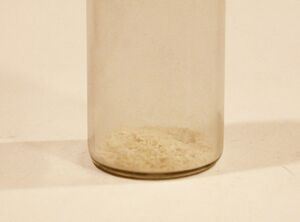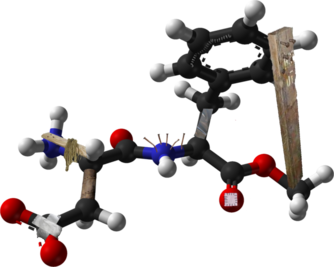Aspartame

“It's safe as drinking from a heavily-used public urinal. Since urine is mostly sterile, we consider that pretty safe.”
Aspartame is a sugar substitute and quite possibly the most insidious deadly substance ever devised by man. It is completely synthetic, not even the atoms it is built from occurred naturally, instead having been mechanically crafted from exotic subatomic bits scrapped off the interior walls of particle accelerators after long days of boson bashing.
History[edit]
Aspartame was invented by James M. Schmuck of Gold Digger Searle & Company (now part of Pfmizer), who was trying to develop a new pest control agent for the murder of ants, rats, and Viet Cong.
As is common with many discoveries, it happened by accident. As Schmuck was getting drunk in preparation for the weekend, he stumbled into a cart being used to transport biohazardous waste out of the building for disposal. The spill mixed together a large quantity of noxious chemicals and radioactive waste.
It is unknown whether it was just the alcohol or hallucinogenic fumes rising from the spill, but for some reason, Schmuck sampled the caustic mix and found it to be rather tasty. Aside from his alcoholism, he also had a gambling addiction and had incurred a significant debt with his bank. In a greed-fueled moment of semi-sobriety, he realized the potential for profit and immediately set out to start commercializing the product as a sugar replacer, that is, right after a week-long binge of drinking and gambling in Vegas.
Unforunately for Schmuck, using the same chemical waste to formulate his substance was not entirely legal. So he devised a loophole wherein he fabricated the ingredients from their atomic nucleus to their electron shells and ionic bonds. Although the molecules still had the same toxic potential and radioactivity, they were completely synthetic and bypassed the normal regulations that would have outlawed their use in a food additive meant for human consumption.
FDA Approval[edit]
Aspartame did not launch with success, its ability to kill test subjects with an estimated median lethal dose (LD50) of 0.45 µg per 1kg of bodyweight made it difficult to get it past the Food and Drug Administration.
The entrepreneurial Schmuck managed to finagle approval however by buying them off. To raise the money required, he sold some of his prototype to the drug lords with which to lace their crack so it would not test positive for sugar when used as payment for the local cops' protection racket. Sadly, his banker found out that he had come up with such funds and not used them to pay his debts and he was found a mouth later at the bottom of the Missouri River in concrete footwear.
Naturally, Gold Digger Searle & Company wasn't about to let ethics get in the way of profit, and continued Schmuck's work after his untimely and unmourned demise. Although they had plenty of funds they had earned by selling medication to the ill and feable at a 98,000% mark up with which to buy off the FDA, unwilling to part with it, they continued to sell aspartame to the drug lords who had by this time discovered the stuff was more addictive than crystal meth.
Ultimately, after killing over ten thousand test chimps and lab rats as well as a few dozen scientists who had not been properly protected during trials, the FDA declared the sugar substitute safe.
In order to market the substance, they registered it as "NutraSweet" to imply it had some sort of nutritional value, when it had absolutely none whatsoever.
Chemistry[edit]
Aspartame is composed of the worst elements of the whole table. It is radioactive, so you'd think plutonium is a good choice, uranium isn't too bad, possibly even their nerdy cousin neptunium, but no, it's berkelium. Even protactinium laughs behind berkelium's back, but it rides the short bus. Other pieces include sulfur, chlorine, arsenic, mercury, and lead.
Other than causing the Earth to want to rid itself of humanity and humanity obliging, aspartame has very little use. Iraq thought to use it in place of anthrax as the UN didn't consider it a weapon of mass destruction, but it melted their scuds. They then thought if it could melt metal, it could be used in welding new tanks, but it caused the metal to crumble into dust. So if it could react with metal like a powerful oxidizer, it could be used to breach bunkers, but it alloyed with their enemies' bomb doors and made them nearly impenetrable. So the Israelis started painting it onto all of their fortifications where it then exploded.
It is the only known substance whose usefulness is in the negative, apart from that ever-elusive "safe and effective" agent for administering the death penalty.
Safety[edit]
The safety of aspartame has been controversial from the very beginning with the paid advocates and incredibly naive on one side, and everyone sane on the other.
The list of health issues it causes is far too lengthy to list, so the following is only a highly condensed summary:
|
|
|
|

